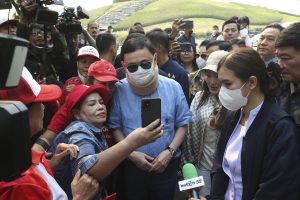Thailand’s former Prime Minister Thaksin Shinawatra yesterday began a three-day visit of his northern hometown of Chiang Mai, less than a month after his release on parole.
According to Reuters, the 74-year-old leader arrived by private jet with his daughter Paetongtarn Shinawatra, the head of the ruling Pheu Thai Party, and an entourage of dozens. The trip to the northern city was his first outside Bangkok since his release on parole last month, and his first visit to Chiang Mai since shortly after he was overthrown in a coup in 2006.
As the Bangkok Post reported, “The visit had every appearance of an official VIP inspection tour, with ministers and civil servants fussing over their guest as they delivered updates on various public works projects.” During yesterday’s itinerary, which saw him visit a botanic garden, a reservoir, and a water management center, the former PM was greeted by supporters.
At the Rajapruek Royal Park botanic garden, Thaksin “met a crowd of dozens with his palms joined together in a traditional gesture of greeting,” Reuters reported. He subsequently took selfies with a few supporters. “Prime Minister of our hearts,” read the caption under a picture of Thaksin emblazoned on the jacket of another.
Thaksin’s visit to Chiang Mai, the main city in a northern region that was – and in many ways remains – a stronghold of Thaksin’s populist movement, is likely to underline the criticisms and rumors that have swirled about the former leader.
Critics on both sides of politics claim that Thaksin has received lenient treatment since returning to Thailand last August, after more than 15 years in self-exile in Dubai. At the time of his return, he faced an eight-year prison sentence on corruption-related charges dating from his time in power. This was quickly reduced to one year, which due to a number of vague but seemingly serious health issues, he was permitted to serve entirely in hospital. After just six months, Thaksin became eligible for parole and was released last month, without having spent a single night in prison. Sure enough, Thaksin continued to sport the neck-brace that he has worn since leaving custody.
Thaksin’s return and the speed of his rehabilitation can be explained as side-effects of the reconciliation between his Pheu Thai Party and the country’s conservative establishment, which took place after last May’s general election. After the election was won by the progressive Move Forward Party (MFP), which campaigns on a much more radical platform than Pheu Thai, conservatives decided that their two-decade-long civil war against the Shinawatras should be concluded, with an aim to focusing on the challenge posed by the MFP.
Thaksin’s large entourage and quasi-official reception in Chiang Mai are also unlikely to quieten rumors that Thaksin is the real power behind the Pheu Thai government. Prime Minister Srettha Thavisin, a former real estate developer chosen as a compromise prime minister candidate on the same day Thaksin returned to Thailand, is scheduled to arrive in Chiang Mai today, on his return from Europe. The ostensible purpose of his visit is to get an update on the dire air pollution in the north of Thailand, but the Thai leader has previously indicated that he and Thaksin might meet during his stop in the north.

































